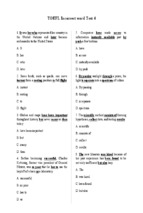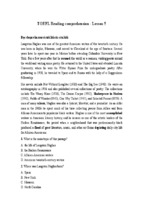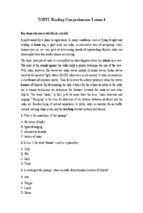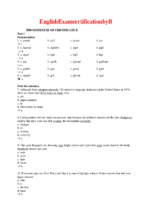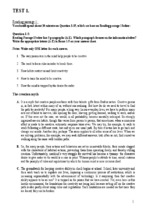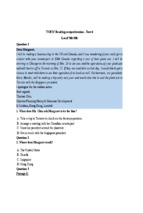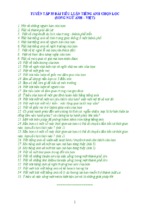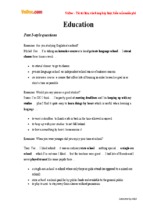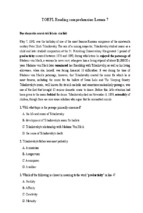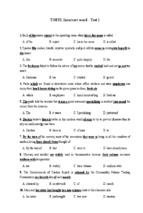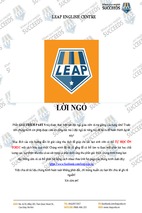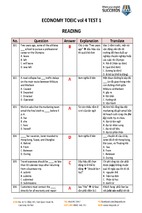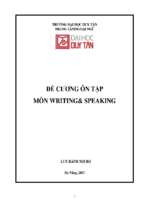220 IELTS
SPEAKING TOPICS
With Practical Tips & Useful Expressions
Taraneh Sadeghian
Mahdieh Azaminejad
220
getf3cScS12zaking gopies
F itzanz
aziz9 filarz
cAlctiMizh clizatrzinziaci
ACKNOWLEDGEMENTS
The authors would like to acknowledge the following people
who made publication of this book possible:
First and foremost, we would like to express our deepest
gratitude to our families whose support, patience, and
words of encouragement carry us forth.
Our special thanks would also go to Mrs. Fereshteh
Ghorbani , Head of Language Dept. at Academic Center of
Education, Culture &, Research (ACECR), who kindly
accepted to edit the first draft of the book and honored us
with her copious remarks and suggestions.
We would also like to express our gratitude to Mr. A.
Yusefzadeh, Deputy for Education at Language Center,
ACECR, Dr. M.Khalaji, and Mr. M. Jesmani, our colleagues
whose insightful comments and sincere cooperation enabled
us to accomplish our task.
We are also profoundly indebted to Ms. Ameneh Barzgar
who made the recording of the Audio CD possible. Also we
would like to appreciate Mrs. Kathy Sullivan for her
invaluable comments on the recordings.
Our heartfelt thanks and appreciation must go to Ms.
Rezvan Behtouie for designing the book cover.
220 IELTS Speaking Topics
TABLE OF CONTENTS
Acknowledgements
Table of Contents
.11
Introduction
III
IELTS Speaking Test (Chapter 1)
.1
Format of the Test
1
How Speaking Is Assessed
3
Description of Band Scores
5
IELTS Speaking Tips
8
How to Improve Your Speaking
14
Most Common Connecting Words
17
Useful Expressions
19
IELTS Speaking Part I (Chapter 2)
26
Animal, Bicycle, Book
26
Color, Computer Clothing, City
27
Dance, Dream, Food
28
Friend, Family, Favorite
29
Festival, Film, Job
30
Health, Hobby
31
Hometown
32
Museum, Music, News, Photograph, School
33
Sea, Sport
34
Television, Travel
35
Transportation, Weather, Wedding
36
IELTS Speaking Part II
37
Accident, Advertisement
38
Ambition, Animal, Apartment
39
Book
39
II
220 IELTS Speaking Topics
Building
40
Choice, Childhood
41
City
42
Competition
43
Dream, Day, Event
Environment, Family
Favorites
.44
47
.49
Festival
51
Food
52
Free times
55
Game
57
Hazard, Health
58
Holiday
59
History, lob
.60
Letter
62
Movie
63
Music
64
Money
65
Magazine, Museum
66
Natural Scenery
67
Object
68
Party
69
Person (famous, influential)
70
Personal Possession
73
Place
75
Photograph, School
78
Shopping, Skill, Sports
82
Stress, Travel
83
Transportation
86
Writing, Website
87
IELTS Speaking Part III
88
Animal, Advertisement
88
Apartment, Book
89
220 IELTS Speaking Topics
Building, Choice, City
90
Competition, Computer
91
Communication, Dream
92
Environment, Event
92
Family, Festival
93
Food
94
Free times. Friend
95
Gift
96
Hazard, Health
96
History, Influential (Person)
97
Job
98
Luck, Magazine
99
Movie, Money
100
Music, Museum
101
Natural Scenery, Object
102
Party, Person
102
Personal Possession
103
Photograph, School
104
Shopping
105
Skill, Sport
106
Travel
107
Transportation
108
Real Tests Part I (Chapter 3)
109
Book, Building, Clothes
109
Daily Routine, Education
110
Family, Festival
110
Friend, Food, Games
111
Health, Hometown
Home, Hobby
Internet, lob, Movie
.112
112
.113
Music, News
114
Shopping, Sports
114
220 IELTS Speaking Topics
Television, Transportation
115
Weather
115
Real Test (Part II & III)
116
Advertisement, Advice
116
Age, Animal
117
Article, Book
118
Child, Change
119
Collect, Dance
120
Decision, Evening
121
Equipment, Environment
122
Excited, Exercise
123
Favorite
124
Film, Flower
126
Free times, Friend
127
Game, Happy event
128
Historical Place/figure
129
History, Hobby
130
Holiday, Hotel
131
Household chore, Natural Feature
132
Invention, Indoor activity
133
Job, Language
134
Letter, Library
135
Magazine, Musical instrument
136
Museum, Neighbor
137
Newspaper, News
138
Old person
139
Party, Pet
140
Photograph, Present
141
Project, Restaurant
.142
Season, School
143
Shopping Center, Skill
144
Sports activity, Success
145
Travel, Typical day
146
220 IELTS Speaking Topics
Toy, Vehicle
147
Weather
.148
LAST Words
149
DOs and DON'Ts List
149
Sample Scripts
Sample Test 1
151
151
Sample Test 2
154
Sample Test 3
.157
Sample Test 4
160
Sample Test 5
164
Sample Test 6
.167
Sample Test 7
.171
Sample Test 8
173
Sample Test 9
.177
Sample Test 10
180
References
184
Introduction
The present book is compiled to help IELTS candidates have
easy access to ample IELTS Speaking samples, collected from various
IELTS preparation course books. It contains 220 IELTS Speaking
Topics that are arranged alphabetically to enable candidates to find
the topics of their interest very quickly and easily. This book also aims
to build up the candidates speaking skill as well as their confidence
by exposing them to useful expressions, and suggested tips. It has an
audio CD which contains 10 sample tests. The main purpose of the
audio CD is to give the candidates enough confidence to organize their
mind and answer the questions especially in part 2 86 3, when they
are given intangible and abstract topics.
The book consists of three chapters. Chapter 1 starts with the
format of the IELTS speaking module, scoring of the test, some
suggested tips, and ends with the useful expressions. Chapter 2
contains compiled topics which are sorted alphabetically and divided
into three parts: part 1, part 2 and part 3 of the IELTS speaking test.
The reference of each topic card is written right below the box and the
reference of the round-up questions are brought in front of the
questions. For the questions which lack reference and page number,
the reference is already given in bolded form in front of the previous
questions. In Chapter 3, the real test topic samples are sorted
alphabetically for the easy use. At the end of the book, there is a
check list of Dos 85 Don'ts which is strongly recommended.
III
220 IELTS Speaking Topics
Chapter 1
IELTS SPEAKING TEST
The speaking test of IELTS is an interview which assesses how well a candidate can
communicate in spoken English. It is a general speaking skill and is broadly the same for
all candidates. In the Speaking Module, each candidate has a face-to-face interview with
an examiner. The interview consists of three parts and takes between 11-14 minutes. The
examiner records the interview for remarking, if necessary.
FORMAT OF THE TEST
Part 1: Introduction & Interview
In this part, the examiner will ask you some general questions about yourself such as your
home, family, education, job, interests/hobbies, and a range of similar topic areas. The
questions on familiar topics will give you chance to convey a lot of information about
yourself and your life. This part lasts between 4-5 minutes.
Part 2: Individual Long Turn
In this part, you will be given a task card (cue card) and asked to talk on a particular topic for
about 2 minutes. You have one minute to organize your mind and prepare yourself before
speaking at length, for 1-2 minutes. This part will last between 3-4 minutes.
The examiner then asks one or two rounding-off questions.
For example:
Describe a TV program that you watch or know about
You should say:
- When it is on and which channel it is on
What kind of program it is
What kind of people watch it
And say if you think that program is popular in other
countries or not, and why
220
IELTS Speaking Topics
Part 3: Two-way Discussion
In this part, the examiner and candidate engage in a discussion of more abstract
issues and concepts which are thematically linked to the topic prompt in Part 2.The
discussion lasts between 4-5 minutes. In this part, the candidate's ability to justify opinions,
analyze, discuss, and speculate about the issues will be assessed. The follow-up questions
related to the above topics could be:
Why do you think some countries produce TV programs for another country?
What factors do you think TV program producers consider for preparing a certain
program?
However, recently it is understood that the above format is not fully observed by the
examiners. The reason might be that the examiner can not be sure of the candidate's ability
and level of proficiency from only part 1. Moreover, most of the candidates are fully
prepared for this part and sometimes they memorize certain samples. Therefore, examiners
may ask candidates their names, candidate numbers, and directly start with Part 2. So, as
preparing yourself for some general questions, such as the reason for taking IELTS test, your
country, your town, your past studies, and your plans for future; be mentally prepared to skip
this part if necessary.
220 IELTS Speaking Topics
How Speaking Is Assessed
The speaking proficiency is evaluated on the following criteria:
Fluency and Coherence: Express your ideas and opinions coherently and clearly,
without long pauses and hesitations.
a
Lexical Resource: Use correct expressions and wide range of vocabulary.
Grammar & Accuracy: Use wide range of structures with the minimum number of
mistakes.
Pronunciation: Make sure your conversation is understood.
The Result is translated into a score on the IELTS nine-band scale. There is no pass
mark for the IELTS exam. Different universities and colleges will have their own IELTS
score requirements.
Band 9- Expert User
The candidate has fully operational command of the language and is fluent with a
complete understanding of English.
Band 8-Very Good User
The candidate is a good user' of English with only occasional mistakes with accuracy
and appropriateness, but his overall command of English is excellent and he can handle
complex detailed arguments well.
Band 7-Good User
The candidate is a 'good user' of English. He can use English well in most situations but
occasionally make mistakes with accuracy and appropriateness of language and has
misunderstandings in some situations.
Band 6-Competent User
The candidate has effective command of language despite some inaccuracies and
misunderstandings. He can use and understand fairly complex language, particularly in
familiar situations.
Band 5-Modest User
The candidate is a 'modest user' of language. .He has some command of English and can
cope with the overall meaning in most situations, though he is likely to make some
mistakes. He is able to handle basic communication in his won field.
220
IELTS Speaking Topics
Band 4-Limited User
The candidate is a 'limited user' of language. He has a basic ability to use English in
familiar situations. He may have frequent problems with understanding and expression
and is unable to use complex language.
Band 3-Extremely Limited User
The candidate is an 'extremely limited user' — this means that he can express and
understand only general meaning in very familiar situations. He will have frequent
breakdowns in communication.
Band 2-Intermittent User
The candidate is an 'intermittent user' — this means that no real communication is
possible except for expressing the most basic information using isolated words or short
basic sentences in familiar situations. He will have a lot of difficulty understanding
spoken and written English.
Band 1-Non-User
The candidate is at the lowest level and means he is a 'non-user' — this means he does not
have the ability to use English except for a few isolated words.
Band 0-Did not attempt the test
The candidate has no assessable information and production.
CNOTE>
From I July, 2007, a small but important change has been made in IELTS Band Scores.
Scores for each part of the test will be reported on the scale from I to 9, but now the
Writing & Speaking modules will be reported in whole or half-bands in the same way as
the Reading and Listening modules. There will be two main benefits to the new
arrangements:
Recognized Organizations will be able to meet their requirements for admission, and
recruitment more precisely, based on more detailed information about the test-taker's
performance.
Test takers will get a report that gives them more information on their strengths and
weaknesses.
220 IELTS Speaking Topics
Description of Band Scores
You belong to Band 0 if you do not attend the interview.
You belong to Band 1 if you can not communicate in English in any way.
You belong Band 2 if you
Pause lengthily before most words
Have little communication ability
Produce isolated words or memorized sentences
If you can not produce basic sentence forms
Your speech is unintelligible
You belong to Band 3 if you
Speak with long pauses
Have limited ability to link simple sentences
Give only simple response and unable to convey basic message
Use simple vocabulary to express personal information
Have insufficient vocabulary for less familiar topics
Make numerous errors
You belong to Band 4 it- you
Can not respond without noticeable pause and may speak slowly, with frequent
repetition and self-correction
Link basic sentences but with repetitious use of simple connectives and some
breakdowns in sentences
Produce basic sentence forms and some correct simple sentences but subordinate
structures are rare
Use limited range of pronunciation features
Have frequent mispronunciations
You belong to Band 5 if you
Keep sentences coming slowly (without pauses)
(See item 3, tips for part3) ,use repetition, and correct yourself
220
IELTS Speaking Topics
Can use simple sentences easily, but complex sentences are difficult for you
Can not say the same thing in a different way (rephrase) or use a synonym for a word
Use grammatically correct simple sentences most of the time. It is rare that you use
more complex sentences and when you do, you make grammatical errors or it is
difficult to understand what you're saying.
You belong to Band 6 if you
Can speak for some time keeping the right speed (like in your first language), with
little difficulties when you repeat words, correct yourself or get lost in words and
stop making mistakes.
Use some connecting words, even if it is not always appropriate
Can discuss topics (familiar or not) for a long time, using wide range of vocabulary
and making yourself clear
Successfully rephrase and use synonyms
Mix simple and complex sentences when you ask, but in making complex ones, you
make mistake. Mistakes are mostly grammatical and examiner can still understand
you.(See Item 9, Tips for part 3)
You belong to Band 7 if you
Have no problem speaking for some time keeping the right speed (like your first
language); your speech is smooth and easy to understand; it is rare that you pause and
look for a word to say, repeat or correct yourself.
Can discuss any topic using a lot of smart words, use English expressions correctly.
Use complex sentences without a lot of grammatical mistakes. There are more
correct sentences in your speech than incorrect.
You belong to Band 8 if you
Speak fluently with only occasional repetition or self-correction
Develop topic coherently and appropriately
Use a wide range of vocabularies
Can use paraphrases effectively as required
Use a wide range of structures
Use a wide range of pronunciation features
Can produce a majority of error-free sentences with only occasional mistakes
220
IELTS Speaking To en
You belong to Band 9 if you
Speak fluent with only rare repetition or self- correction
Develop topic fully and appropriately
Use vocabulary with full flexibility and precision in all topics
Use a full range of structures naturally and appropriately
Produce consistently accurate structures apart from "slips"- characteristic of native
speaker speech
Use a full range of pronunciation features with precision and subtlety
Are effortless to understand
A‘
220 IELTS Speaking Topics
IETLS SPEAKING TIPS
Before the Interview
Be present at the venue at least 30 min. before the interview.
Before going into the interview room, take a DEEP breath!
Dress appropriately: neither too casual nor too formal.
Greet the examiner. Say "Good Morning Sir/Madam or "Good Afternoon".
Be polite, friendly, and relaxed.
During the Interview
TIPS for Part I
Make eye contact with the examiner. Although theoretically you can speak great English
with your head down, the fact is you may not seem as confident. Although there is no mark
for confidence, you need to present yourself in as positive way as possible.
Make sure you understand the examiner and are able to communicate without grammar
mistakes.
Consider this part of the test as meeting someone for the first time and telling him about
yourself. Try to be relaxed and keep conversation going.
Speak clearly and don't worry about your accent. Everyone has an accent when they
speak English. The important point is that you enunciate the best you can so the examiner
can understand you. Rehearse in advance to overcome any obvious problems. If you make a
mistake, don't worry, just correct yourself and keep going.
S. If the examiner asked you questions about your home town, neighborhood, or city; use
good words about your home town, etc. to impress the examiner. Do use negative
expressions to talk about your country or city. If you express all bad things always when you
220 IELTS Speaking Topics
are talking, the examiner won't be impressed by your words unless you are asked to explain
the problems.
Tills for Part 2
I. In part 2, you have one minute to think about the topic and organize your mind. The
examiner will give you a piece of paper and a pencil to take notes because speaking for two
minutes without stopping is not easy. The biggest mistake students make is not to take
notes. Candidates who do not take notes often say, "Uh. I think may be, um,... well,...,
Ur..., It seems to me, ...".
"Um and Uh" are the sign of hesitations. It means you are not sure of what to say or you do
not have any ideas to express. In both cases, you are most likely to lose scores with long
pauses and hesitations. Therefore, use notes to help you organize your mind and ideas,
remember what to say and how to say.
In this part. use P.R.E.P." method. Start with "P"- make one sentence about your main
Point/ topic. Then give two or three sentences to provide "R", a Reason. You need to
support your ideas. Next give "E", an Example. Describe the example using two or three
sentences. Finish by repeating "P". your main points, but use a different sentence. If you
have extra time, give a second example.
Do not memorize answers to prepare for the test. The interviewer has enough
experience to recognize that you are not speaking naturally and will change the subject or
give you a lower score.
Avoid short,
" , "no" answers.
Explain names or words which are in another language. For example, if you are asked
to speak about a festival, which involves using words in your language, say the words clearly
and give the meaning so the examiner can follow your expressions.
Try to make good sentences to make good impression. For example, in part I, if you give
easy answers, the examiner can not be sure of your level whether you are Band 4 or may be
I3and 5. But if you give good and specific answers with short explanations, the examiner
will think you could be Band 6 or even Band 7.
r
i
y
220
IELTS Speaking Topics
Keep a steady pace. Do not speak too fast or too slow.
Do not take so much time. Two sentences for each answer are usually enough. If you have
a long time introduction, the examiner may think you do not know how to answer the
questions.
Remember you do not need to present true ideas or facts. Some times, you do not have
any personal idea or example on a certain topic to say.
Avoid words such as: I have no idea. I don't know what to say, etc. Try to make up your
own story related to the topic and explain the connection.
For example, if you are asked to talk about a foreign country you have been to, but in fact
you have never visited a foreign country before, try to make your own story.
Do not worry about the time. Try to organize your conversation for about 2 minutes
but the examiner will stop you when time is up.
Record yourself. Play the recordings back to see how easy you are to understand and
how you could improve. You should practice one or two topics every day before your exam.
Avoid using slang or very informal language.
Use easy words and expressions if you are not very confident.
Remember to practice. Use a watch; give yourself one minute to take notes on a topic,
and then two minutes to make four or five sentences to express your ideas on the topic. Make
sure to provide answers to all of the questions in Part 2.
Tips for Part 3
I. In part 3, which seems to be the most difficult part of speaking test, when the examiner
says "Now, I would like to ask you some more questions related to part 2, you know that
Part 3 is starting. Be ready!
2. In Part III, you could be asked to talk about changes either in your country or in
International trends. Remember in this part, you need to justify and support what you say by
examples, explanation, story, and statistics.
Example I: Tell me about the recent changes in university graduation in your country.
220
IELTS Speaking Topics
Answer: Well, not only in my country but also around the world, there is a remarkable
increase in the number of university graduates. I can't speak for the world, but in my country
this is partly due to subsidized study costs. Only 10-15 years ago, the option of going to
university was open to those who were wealthy enough, but now people from all
backgrounds have an equal opportunity to follow their education. I think, this is definitely a
step in the right direction, although there are still potential students who don't have the
means.
Comment: As you see, the first sentence includes the candidate's main idea and the
following sentences are supporting the main idea.
Example 2: Do you prefer to watch a movie on TV or in the cinema? Why?
Answer: Actually, I much prefer to go to cinema because the screen is bigger than any TV,
and the sound is really good. For example, I thought the film "Titanic" was great because the
music was romantic, and it just wouldn't have been the same if it was played at home on a
normal television.
Try to use "FILLERS" instead of pausing and hesitating. Fillers are set of the words
which can give you the opportunity of tilling the gaps you face during speaking such as:
I mean
; You see....; Well, let me see
perspective,
; You know,. ; Well,
; If you see what I mean...; Let's get this into
; Uh,....
Before you start speaking, think of different tenses. You must use past and present tenses
to compare tiko aspects of a topic.
For example, if you are asked:
"How has the method of teaching changed in recent years?"
You should say:
Well, in the past teacher used to be the only speaker in the class, whereas nowadays,
students are also involved in teaching and learning process."
Use the General-Specific technique. As soon as you hear the question, give a general
opinion about the topic. Then give a specific reason or example in the next sentence or two.
Among other things in part 3, you will be asked to; speculate about the future, give
opinions, suggest a solution to a problem, or describe a process or a procedure. Try to
come up with a complete answer. For example, if you are asked how you would solve traffic
problems world wide, don't just talk about buying more buses; consider where the money for
- Xem thêm -

